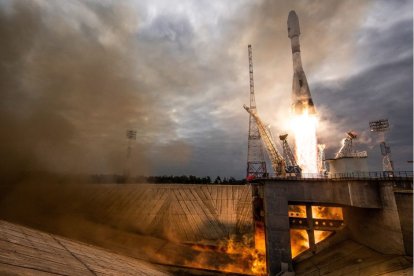Russia launches its first mission to the Moon since 1976
The goal is to become the first country to explore the lunar south pole, where frozen water is believed to exist.

(Cordon Press)
Russia's space agency, Roscosmos, successfully launched its first space mission to the Moon since 1976. It´s been named Luna-25, an unmanned robotic mission that revitalizes Moscow's space program.
The module is intended to land on the south pole of the Moon. The mission consists of a Soyuz rocket carrying a probe weighing about 1,700 pounds that lifted off Friday from the Vostochny space base in Siberia. In an estimated five days of travel, the unmanned mission should reach its destination. According to Roscosmos sources quoted by AFP, a landing at the lunar south pole is planned for August 21.
The first time at the South Pole
If successful, Russia would become the first country to land a mission on the south pole of the Moon. Almost a month before the launch of Luna-25, India also launched its own mission with the same objective, albeit with a slower path. The Indian mission should reach its landing zone on the Moon on the 23rd.
The Luna-25 mission is a breath of fresh air for Russia. During the Soviet era, the USSR was the first country to successfully launch a mission into space. It is also the only one of the three countries in the world - USSR, China and the United States - to have landed on the Moon. However, the dismantling of the Soviet economy meant a serious deterioration in Russian space capabilities.
Geopolitical objectives
According to Vitaly Egorov, a Russian space analyst consulted by AP, "studying the Moon is not the real goal" of the Russian mission. "The goal is political competition between two superpowers - China and the United States - and other countries that also want to claim the title of space superpower," the analyst explained. The Roscosmos agency claims that if there is success in this mission, Russia will show itself as a state capable of carrying a cargo to the Moon.
The Luna-25 mission had been planned for more than two decades. In 2010 the first contract was signed to start the project. The war in Ukraine posed a challenge to the development of the project mainly due to Western sanctions on Russia that restricted Russian access to cutting-edge technology. In April 2022, the European Space Agency (ESA), which had planned to collaborate with Roscosmos for the Luna-25 mission, decided to end all its Russian collaboration programs.
RECOMMENDATION





















